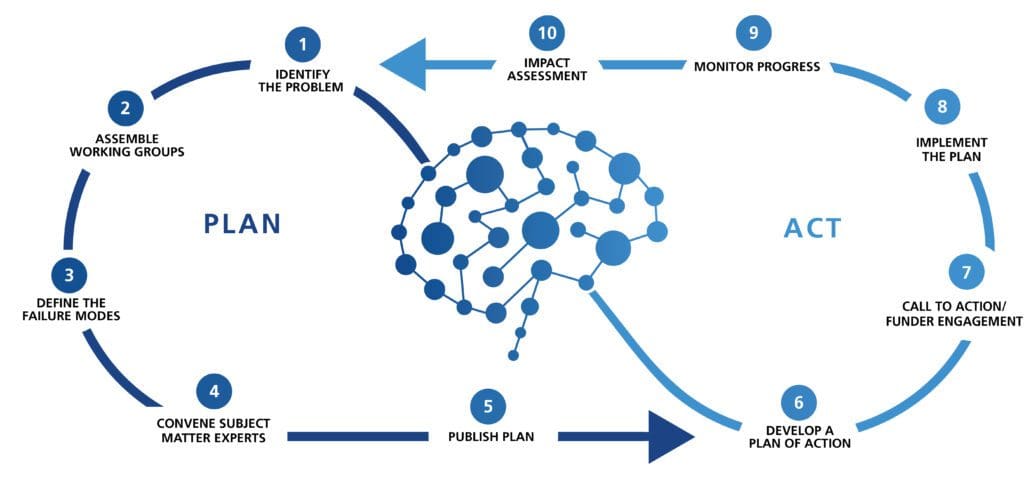Cohen Veterans Bioscience is driving the development a Brain Trauma Blueprint to guide a next generation of diagnostics and therapeutics across Traumatic Brain Injury and Post-Traumatic Stress Disorder.
The theme of the second State of the Science Summit was Paths to Treatment for Traumatic Brain Injury(s) with a focus on the taxonomy and nosology of the chronic sequelae, challenges and opportunities in clinical practice and development, and etiology and mechanism of persistent symptoms1. As measurement tools advance, research has been able to focus on different types of injury, beyond the mild, moderate, and severe classifications. To augment and support the many efforts across fields and organizations over the past decade, we aim to map a consensus blueprint to drive translational science for TBI.
The resulting recommendations create actionable research priorities to be prioritized across the research ecosystem.

Speakers
PATRICK S.F. BELLGOWAN, PHD
LISA BRENNER, PHD, ABPP
DAVID BRODY, MD, PHD
THOMAS DEGRABA, MD
DAVID CIFU, MD
FIONA CRAWFORD, PHD
KRISTOPHE DIAZ, PHD
CHANTELLE FERLAND-BECKHAM, PHD
JAM GHAJAR, MD, PHD, FACS
JESSICA GILL, PHD, RN, FAAN
MAGALI HAAS, MD, PHD
NICOLE HARMON, PHD
RONALD L. HAYES, PHD
MICHAEL HOFFMAN
STUART HOFFMAN, PHD
GRANT IVERSON, PHD
WILLIAM S. KORINEK, PHD
ANTHONY KONTOS, PHD
SAAFAN MALIK, MD
CARLOS PEÑA, PHD
RETSINA MEYER, PHD
ROGER MURRY
RACHEL RAMONI, DMD, SCD
UZMA SAMADANI, MD, PHD
ROSINA SAMADANI, PHD
DOUGLAS SMITH, MD
MICHAEL E. SINGER, PHD
JAMES STONE, MD, PHD
CHRISTOPHER WHITLOW, MD, PHD
STEPHEN XENAKIS, MD
ELISABETH WILDE, PHD
Moderators
DAVID BIONDI, DO, FAAN
KRISTOPHE DIAZ, PHD
CHANTELLE FERLAND-BECKHAM, PHD
NOEL GUNTHER
MAGALI HAAS, MD, PHD
LEE LANCASHIRE, PHD
RAJEEV RAMCHAND, PHD
Proceedings from the 2019 State of the Science Summit:
Fostering Collaboration to Advance Solutions for Traumatic Brain Injury (TBI)
Cohen Veterans Bioscience is driving the development a Brain Trauma Blueprint to guide a next generation of diagnostics and therapeutics across Traumatic Brain Injury and Post-Traumatic Stress Disorder.
In 2019, we hosted our second State of the Science Summit (SOSS) with over 100 thought leaders to foster consensus around potential paths to treatment for TBI. The goal was to define TBI beyond the typical classifications of mild, moderate or severe, in order to more clearly describe underlying disease mechanisms. The Summit focused on the chronic sequelae of TBI and aimed to identify current knowledge gaps in the etiology and mechanisms of persistent TBI symptoms.
The resulting recommendations create actionable research priorities to be prioritized across the research ecosystem and will be rolled out in the next few months.
About the 2019 State of the Science Summit
Rationale for the 2019 State of the Science Summit
The Brain Trauma Blueprint is an initiative aimed at accelerating an era of personalized medicine for survivors of brain trauma through a series of invitation-only State of the Science Summits (SoSS). With few FDA-approved treatments for long term neuropsychiatric sequelae of traumatic brain injury (TBI) and post-traumatic stress disorder (PTSD), the development of targeted therapeutics will require clearer understanding of their biological underpinnings. By fostering collaboration across the broader stakeholder community, we will enable translational research gaps to be bridged and achieve solutions sooner for those suffering from trauma-related brain disorders.
Each SoSS includes a review of the landscape drafted by a Scientific Planning Committee, which comprises of key thought leaders with deep expertise in trauma-related brain disorders. The first of the two-day meeting consists of presentations and working sessions discussing the state of the field and major research gaps. The second day includes time to define, refine, and prioritize research gaps.
The trauma-related brain disorder research community has repeatedly lamented the lack of mechanistically targeted therapeutics for TBI. Through breakout and group discussions, consensus around knowledge gaps and strategies to leverage the combined intellectual resources of the scientific and clinical communities will lead to the generation of research priorities that will overcome the gaps and hasten the development of precision-therapeutic options for individuals living with trauma-related brain disorders. This requires advancing knowledge on molecular mechanisms of injury, more refined methods of diagnosis, subtyping patients to better select potential treatments for their disease mechanism, and successfully advancing through clinical trials. A blueprint of past and current research activities can help guide development efforts and accelerate the progression towards a new generation of precision diagnostics and targeted therapeutics.
Historical Context
TBI is currently classified as mild, moderate, or severe and is managed based on a level of consciousness, irrespective of the heterogenic pathophysiology leading to that severity score. The ability of these classifications to predict subsequent patient burden, including neurodegenerative trajectory, is not well understood and can be complicated by subjective measurement techniques, fluctuating presentations and comorbid disorders. Indeed, despite initial hospitalization and inpatient rehabilitation services, about 50% of people with TBI will experience further decline in their daily lives or die within 5 years of their injury; in cases of mild injury where patients often fail to seek help, delayed sequelae may arise leading to cognitive decline or other functional deficits.
While great strides have been made in managing patients after acute brain injuries, particularly those classified as severe, the field is increasingly looking to address the chronic sequelae of mild brain injuries by focusing on identifying the molecular mechanisms underlying the long-term symptoms using animal models2. This requires identifying gaps in our understanding of the presence, presentation, trajectories, and underlying mechanisms of the long-term effects. By leveraging the power of leaders across the brain health spectrum and strengthening the cohesion of the scientific, clinical and patient communities within TBI, the community will have a roadmap to identify the underlying biological processes across TBI injury types, improve patient biotyping and better advance clinical trials. This will translate to precise diagnostics and prognostics for those suffering from brain injuries and ultimately reduce patient burden.


















